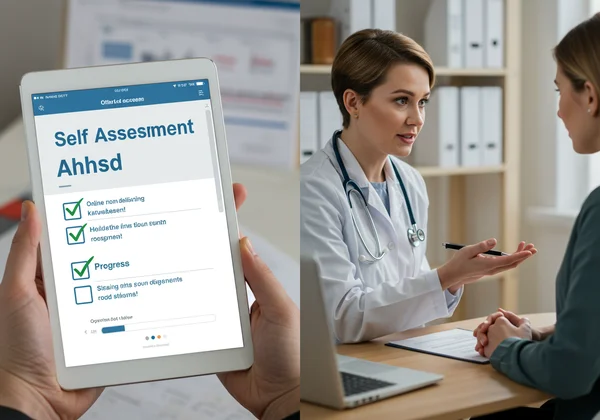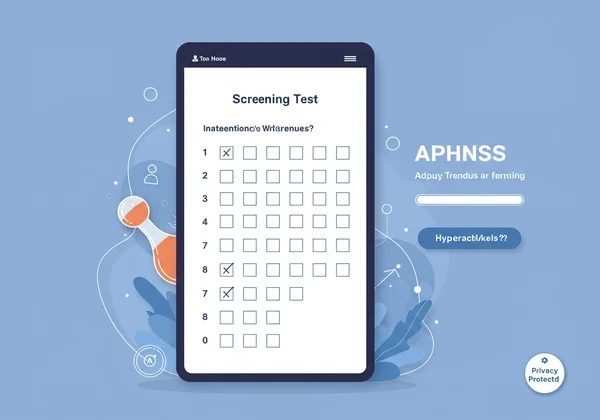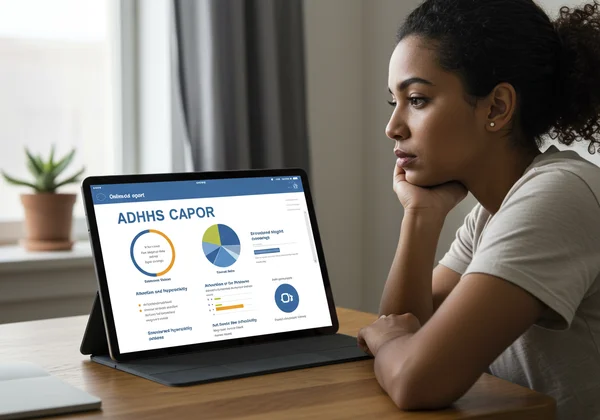I test ADHD online sono accurati? Screening vs. Diagnosi: Una Spiegazione
Ti senti distratto, sopraffatto o costantemente in ritardo? Potresti chiederti se il Disturbo da Deficit di Attenzione/Iperattività (ADHD) sia la ragione. La tua ricerca di risposte ti ha probabilmente portato a quiz online, sollevando una domanda cruciale: i test ADHD online sono accurati? Come appassionato di psicologia che mira a rendere accessibili le conoscenze sulla salute mentale, sono qui per demistificare questi strumenti. È possibile fare un test per l'ADHD online? Sì, a scopo di screening, e questa distinzione è cruciale.
Questo articolo ti guiderà attraverso l'accuratezza e lo scopo dei test ADHD online, chiarirà la vitale differenza tra uno screening e una diagnosi clinica, e ti mostrerà come uno strumento affidabile possa essere un primo passo potente. Comprendere questa differenza è fondamentale per utilizzare queste risorse in modo responsabile nel tuo percorso di scoperta di te stesso. Un ottimo punto di partenza per questo viaggio è uno screening ADHD gratuito ben progettato.
Comprendere l'Accuratezza e lo Scopo dei Test ADHD Online
Internet è pieno di strumenti che affermano di valutare l'ADHD, ma non tutti sono uguali. Il valore di un test online risiede nel suo scopo e nelle sue basi scientifiche. Un test ADHD online credibile non è uno strumento diagnostico; è uno strumento di screening progettato per aiutarti a identificare potenziali tratti che si allineano con i sintomi dell'ADHD.
Cosa rende un test ADHD online affidabile?
Uno strumento di screening affidabile ha diverse caratteristiche chiave. In primo luogo, dovrebbe basarsi su criteri clinici stabiliti, come il Manuale Diagnostico e Statistico dei Disturbi Mentali (DSM-5). Questo assicura che le domande a cui rispondi siano rilevanti per il modo in cui i professionisti valutano l'ADHD. In secondo luogo, deve essere trasparente riguardo ai suoi limiti, dichiarando chiaramente che non fornisce una diagnosi. Infine, dovrebbe proteggere la tua privacy, permettendoti di ottenere risultati senza richiedere informazioni personali sensibili. Lo screening della nostra piattaforma è costruito su questi principi, offrendo un'esperienza sicura e scientificamente informata.
Il ruolo dello screening ADHD online nel tuo percorso
Pensa a uno screening online come a una fase preliminare di raccolta di informazioni. È un modo accessibile e a bassa pressione per organizzare i tuoi pensieri e le tue esperienze. I risultati possono fornirti una panoramica strutturata delle tue sfide con l'attenzione, l'iperattività o l'impulsività. Questo lo rende un primo passo prezioso verso una migliore comprensione di te stesso e può servire come un eccellente punto di partenza per una conversazione più produttiva con un professionista della salute se scegli di fare quel passo successivo. Ti aiuta a passare da una vaga sensazione di "c'è qualcosa che non va" ad avere punti concreti da discutere.
Screening ADHD vs. Diagnosi Clinica: Conoscere la Differenza
Questo è forse il concetto più importante da comprendere. Sebbene entrambi siano correlati all'identificazione dell'ADHD, lo screening e la diagnosi servono a funzioni fondamentalmente diverse. Confondere i due può portare a incomprensioni e ansia.

Quando un test online è sufficiente rispetto a una valutazione professionale?
Un test online è sufficiente quando il tuo obiettivo è l'auto-esplorazione e un'intuizione preliminare. È per la persona che si chiede: "Potrei essere io?" o il genitore che cerca di capire il comportamento di un bambino. Il rapporto che ricevi da uno strumento come il nostro test ADHD online gratuito può convalidare i tuoi sentimenti e darti la fiducia per cercare ulteriore aiuto.
Tuttavia, una valutazione professionale è necessaria per una diagnosi ufficiale, che è richiesta per accomodamenti accademici, supporto sul posto di lavoro e trattamenti medici come i farmaci su prescrizione. Uno strumento di screening non può sostituire il giudizio sfumato di un clinico qualificato.
Le componenti di una valutazione clinica completa dell'ADHD
Una valutazione clinica formale è molto più approfondita di qualsiasi quiz online. Uno psicologo, psichiatra o altro professionista qualificato condurrà una valutazione completa che spesso include:
- Interviste Dettagliate: Discussione della tua storia personale, accademica, di sviluppo e medica.
- Liste di Controllo dei Sintomi e Scale di Valutazione: Moduli standardizzati da compilare per te (e talvolta per un membro della famiglia o un partner).
- Revisione della documentazione: Esame di pagelle scolastiche passate o valutazioni delle prestazioni.
- Esclusione di Altre Condizioni: Assicurarsi che i sintomi non siano meglio spiegati da altri problemi come ansia, depressione o una disabilità di apprendimento.
Questo processo approfondito fornisce l'accuratezza necessaria per una diagnosi che cambia la vita, qualcosa che un test online automatizzato non è progettato per fare.
La Scienza Dietro Strumenti di Screening ADHD Affidabili
Per fidarsi di uno strumento di screening, è necessario sapere che è costruito su solide basi. I test online affidabili non sono solo domande casuali; sono attentamente elaborati sulla base di decenni di ricerca psicologica e di quadri diagnostici stabiliti. Questo è ciò che distingue uno strumento utile da un semplice quiz su Internet.
Come i criteri DSM-5 guidano la progettazione delle domande del test ADHD
Il gold standard per la diagnosi psichiatrica negli Stati Uniti e in molti altri paesi è il DSM-5. Esso delinea criteri specifici per l'ADHD, inclusi schemi di disattenzione e/o iperattività-impulsività che interferiscono con il funzionamento o lo sviluppo. Uno strumento di screening online di alta qualità progetta le sue domande per riflettere direttamente questi criteri DSM-5. Ad esempio, una domanda sul perdere cose necessarie per i compiti si collega direttamente ai criteri di disattenzione. Questo assicura che lo screening stia misurando tratti clinicamente rilevanti. Perché non esplorare i tuoi tratti con un test basato su questi standard?
Comprendere la validità e l'affidabilità del test nelle valutazioni ADHD
In psicologia, la validità del test si riferisce a quanto bene un test misura ciò che afferma di misurare. L'affidabilità significa che il test produce risultati coerenti nel tempo. Sebbene nessuno screener online possa eguagliare la validità di una valutazione clinica completa, uno ben sviluppato utilizza un formato di domande che è stato convalidato nella ricerca per correlare fortemente con i sintomi dell'ADHD. Si tratta di fornire un indicatore affidabile, non un verdetto infallibile.
La nostra metodologia trasparente per lo screening dell'ADHD
Crediamo in una metodologia trasparente. Il test ADHD disponibile sulla nostra homepage è uno strumento di screening accessibile progettato per adulti, bambini e chiunque cerchi chiarezza. Consiste di 18 domande basate su standard di screening ADHD ampiamente riconosciuti. Dopo aver completato il questionario, il nostro sistema basato su AI analizza le tue risposte per generare un rapporto personalizzato. Questo rapporto non ti dà solo un punteggio; offre approfondimenti sui modelli relativi a disattenzione e iperattività. Ci impegniamo per la privacy degli utenti: non è richiesta alcuna registrazione. Puoi ottenere il tuo rapporto e iniziare il tuo viaggio verso la comprensione con fiducia.

Il Tuo Primo Passo Verso la Chiarezza: Utilizzare lo screening ADHD online
Navigare nel mondo dell'ADHD può essere confuso, ma non devi farlo da solo. Sebbene non sostituiscano una diagnosi professionale, i test ADHD online sono strumenti preziosi per l'auto-riflessione. Ti danno potere trasformando vaghe preoccupazioni in intuizioni strutturate. Comprendendo la differenza tra screening e diagnosi, puoi usare queste risorse in modo responsabile. Uno screening affidabile è un potente primo passo verso la chiarezza, dandoti la fiducia per cercare consigli professionali e iniziare una conversazione produttiva.
Pronto a fare quel primo passo in modo sicuro, privato e perspicace? Fai il nostro test ADHD gratuito per ricevere il tuo rapporto personalizzato e iniziare il tuo viaggio verso una maggiore consapevolezza di te stesso.

Domande Frequenti sui Test ADHD Online
È davvero possibile fare un test per l'ADHD online?
Sì, è possibile screening per i tratti dell'ADHD online. Siti web affidabili offrono strumenti di screening basati su criteri clinici (come il DSM-5) che ti aiutano a identificare se hai sintomi coerenti con l'ADHD. Tuttavia, questi strumenti non possono fornire una diagnosi formale; questa deve essere fatta da un professionista sanitario qualificato.
Questo test ADHD online è sufficientemente accurato da potersi fidare?
Un test ADHD online di alta qualità, come il nostro strumento di screening ADHD online, può essere uno strumento di screening affidabile e accurato. La sua accuratezza deriva dall'essere basato su standard scientifici stabiliti. Indica in modo affidabile potenziali tratti ADHD, rendendolo un ottimo punto di partenza, ma non dovrebbe essere trattato come una conclusione diagnostica finale.
Come viene diagnosticato l'ADHD negli adulti?
Il test dell'ADHD negli adulti è un processo completo condotto da un clinico. Implica interviste dettagliate sulla tua storia di vita, difficoltà e punti di forza, scale di valutazione standardizzate e una valutazione approfondita per escludere altre condizioni che possono mimare i sintomi dell'ADHD, come ansia o disturbi dell'umore. Una valutazione professionale è sempre il percorso migliore per una diagnosi formale.
Cosa fare dopo aver completato un test ADHD online?
Dopo aver fatto un test ADHD online, prenditi del tempo per rivedere il tuo rapporto personalizzato. Usa i risultati come strumento di auto-riflessione. Se il rapporto indica un'alta probabilità di tratti ADHD e risuona con le tue esperienze di vita, il passo successivo raccomandato è condividere questi risultati con un medico o un professionista della salute mentale per una valutazione completa.
